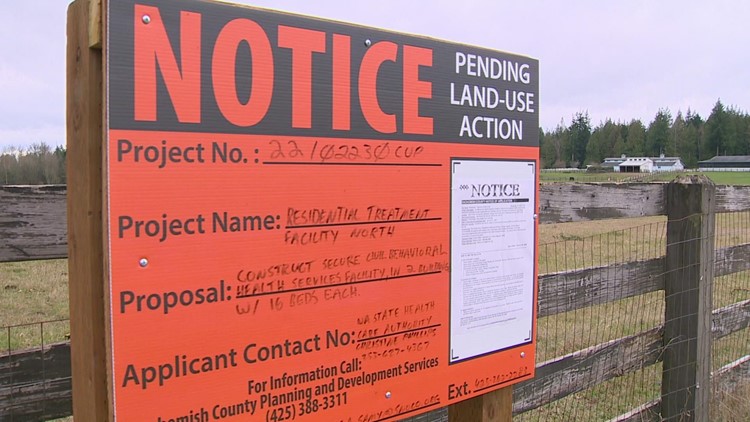STANWOOD, Wash. — The rolling hills and pastoral landscapes are what often draw people to Stanwood.
The scenery brings people like Armando Nienhuser, whose extended family have lived in the same house for three generations. But he worries about who could be moving in right across the street.
"It's not just some skating center for children to play at or anything like that. It's not harmless. It's not harmless to the community," Nienhuser said.
The state wants to build a facility to house up to 32 mentally ill people for up to six months at a time. They would be people who have been involuntarily committed, meaning they would be held against their will.
The state is trying to move away from large-scale mental institutions like Western State Hospital near Tacoma.
The new model is smaller, community-based centers where patients can be closer to friends and family for support.
People do better and often move back into the community more easily under such conditions, according to experts.
However, Nienhusen said his mother used to work at Western State, so he knows the risks brought on by people who have been involuntarily committed.
"They can be a danger. They are going to try to escape. It will happen," he said.
A spokesperson for the State Healthcare Authority said the facility will be secure and will not house people involved with the criminal court system. She said the residents are more likely to be victims of crime than perpetrators.
In a written statement the spokesperson said, "Individuals who are getting treatment under the Involuntary Treatment Act will not be able to leave the facility on their own. The facility will be secure and locked, with all appropriate policies and procedures to ensure safety of the residents, staff, and community. Individuals receiving treatment here may be considered a danger to themselves or unable to take care of their own needs."
The need for a facility like the one being proposed is significant because there are only 150 long-term care beds in Washington for the involuntarily committed. Six of them are in Snohomish County.
The spokesperson said people who get inpatient behavioral health services closer to home have a better support network and are more successful in recovery.
The statement goes on to say, "This is part of a statewide effort to build community-based behavioral health capacity. We need a continuum of services that can prevent individuals from being committed to state hospitals and can support people in their recovery after treatment."
In a letter to KING 5, the National Alliance on Mental Health (NAMI) Seattle explained the process for mental health treatment in Washington:
"For those who pose a danger to themselves or others and have a criminal charge treatment is addressed by a forensic navigator at Western or Eastern State hospitals. These cases are for people experiencing acute psychosis, prolonged mania, and other severe symptoms that require extensive treatment to participate in their own defense at trial or to be moved to a less restrictive care setting. Civil commitments for serious mental illness can start at a locked facility, and as recovery progresses they move gradually to less restrictive care and treatment.
"Despite public perception, many individuals who have been committed to our state hospitals live productive and fulfilling lives."
Stanwood Mayor Sid Roberts is a real estate agent of 40 years. He understands the need for these centers but believes it isn't fair to expect neighbors to live so close to one.
He falls back on what he was taught in real estate school.
"The first thing you learn is location, location, location," Roberts said. "This is, in my opinion, the wrong location, the wrong location, the wrong location."
A hearing examiner will have the final say on whether the facility is allowed.



